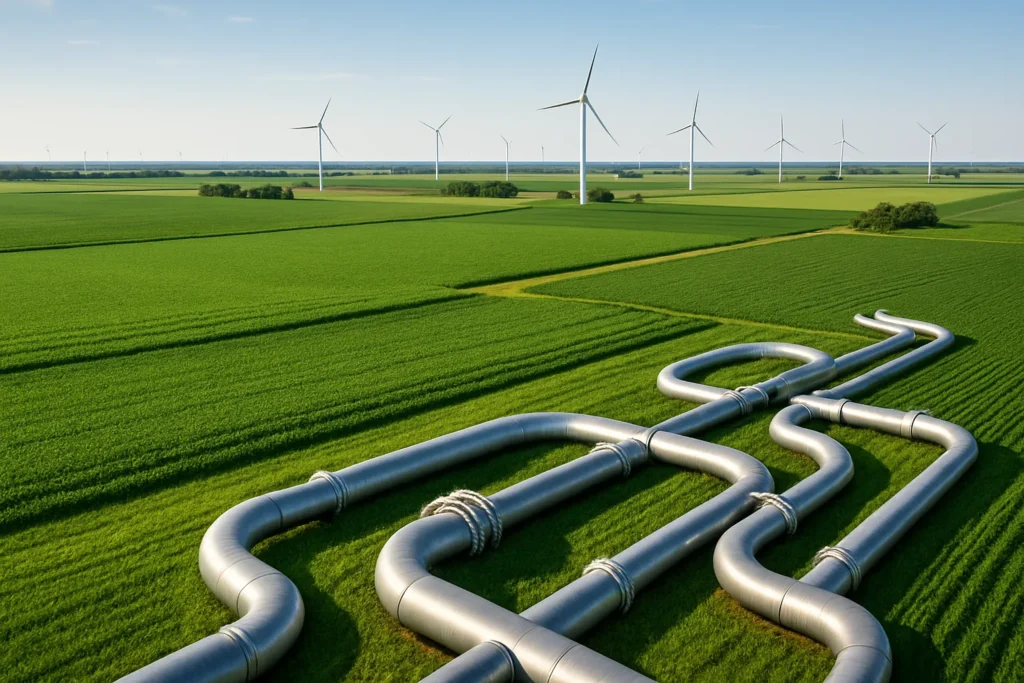Pipeline Politics: The Clash Between Property Rights and Economic Promises
In the heartland, where cornfields meet prairie winds, a new battleground has emerged—one that pits private landowners against powerful energy interests and exposes deep fissures within the Iowa Republican establishment. The Iowa Senate’s recent passage of House File 639, a bill restricting the use of eminent domain for carbon capture pipelines and strengthening landowner protections, has propelled the state into a defining moment over who truly benefits from these ambitious infrastructure projects.
The fight is not just about pipes in the ground—it’s about the principle of whose interests come first: rural Iowans or corporations masquerading as public benefactors. The backdrop is the controversial Summit Carbon Solutions pipeline, designed to shuttle captured carbon dioxide from ethanol facilities across the Midwest to North Dakota for underground storage. Proponents claim these projects will unlock new “green” ethanol markets and secure Iowa farmers’ livelihoods in a low-carbon economy. Yet, for many landowners and a notable bloc of Senate Republicans, the specter of the government granting private companies the right to forcibly seize property via eminent domain is a step too far.
Senator Jeff Taylor, a leading advocate for the bill, didn’t mince words, framing the struggle as one of justice, truth, and good government. “This is about constitutional propriety and protecting families who have waited four legislative sessions for action,” he affirmed in debate, capturing the emotional current that has animated Iowan landowners. Taylor’s rhetoric speaks to a broader progressive contention: government must stand up to corporate overreach, not abet it—no matter how rosy the economic forecast.
What the Bill Changes—And Why It’s So Divisive
House File 639 represents a dramatic shift in Iowa’s approach to infrastructure development and eminent domain. It mandates that pipeline projects serve the “public interest,” reforms how the Iowa Utilities Commission conducts landowner meetings, and notably requires pipeline companies—not property owners—to cover insurance premiums or damages if the infrastructure causes higher costs or loss of coverage. These provisions, supporters say, are simple fairness in action.
The insurance requirement aims to correct a historical imbalance where rural landowners, with little recourse, bear costs for risks imposed on them by multinational firms. “The bill finally addresses landowner concerns that have gone unanswered for years,” said Alicia Vasto of the Iowa Environmental Council, echoing widespread frustration amongst rural constituents. The extended debate and the high number of Republican boycotts to force the bill onto the floor testify to its political gravity—and the growing rebellion among GOP ranks against deference to industry.
But the battle lines are hardly neat, as opposition comes equally fierce from economic conservatives and some establishment Republicans. Senator Tim Kraayenbrink denounced the legislation as “poorly written,” predicting costly lawsuits and slower economic growth—potent anxieties given that the Iowa Utilities Commission has already handed Summit Carbon Solutions its eminent domain permission. Political observers warn of possible legal war on two fronts: from pipeline companies and from landowners already contracted for the project.
“It’s a false choice between economic development and respecting the rights of the people who make this state work. When corporations win without consensus, nobody really wins at all.”
Senator Mike Bousselot’s failed amendment to exempt already-authorized projects from the new rules highlighted another fear: that the law could set a precedent for future lawsuits—not just from pipeline backers, but from environmental activists aiming to stop fossil fuel projects of any stripe. No surprise, then, that energy industry lobbyists and the Iowa Renewable Fuels Association have decried the bill as a threat to future investments, warning of a chilling effect across all infrastructure projects.
Divided Loyalties: Land, Liberty, and the Progressive Case for Reform
The sharp divisions in the Iowa Senate—12 Republicans breaking with their leadership, passionate floor speeches, and the rare move of budget boycotts to force a pipeline vote—are more than procedural drama. They lay bare a state and a party wrestling with foundational questions about land, freedom, and the social contract. Whose future are lawmakers protecting? The interests of a private carbon pipeline company reliant on government-bestowed power, or those of multigenerational family farmers?
Beyond the policy text, the stakes are deeply personal in rural Iowa, where property rights and self-determination are woven into the fabric of identity. Yet, as climate imperatives mount, progressives understand that decarbonization projects alone do not justify violating basic civil liberties or enabling corporate giants to override democratic control of land and resources.
Historical echoes abound. Much like the mid-20th-century fights over rural electrification or the more recent clashes over the Keystone XL pipeline, Iowans are being asked to decide whether community consent and environmental justice must temper—or halt—corporate expansion. According to a 2022 Pew Research Center study, over two-thirds of rural Americans distrust government promises that large projects will benefit their towns; for them, past experience weighs heavier than today’s press release.
Harvard legal scholar Molly S. McGuire notes, “Eminent domain is a necessary but blunt instrument of democracy. When used to enrich private actors and paint it as ‘public good,’ we erode the very trust democracy relies on.” McGuire’s words, and the Senate’s contentious vote, encapsulate why this bill stirred such passion: the question isn’t merely economic growth, but whether Iowa will set a standard for democratic, sustainable development that respects all its people.
As Governor Kim Reynolds weighs her decision, Iowans watch closely, aware that the outcome will reverberate well beyond this legislative session. Will the state’s future favor the autonomy of landowners and principled government, or will expedience and industry win the day?

